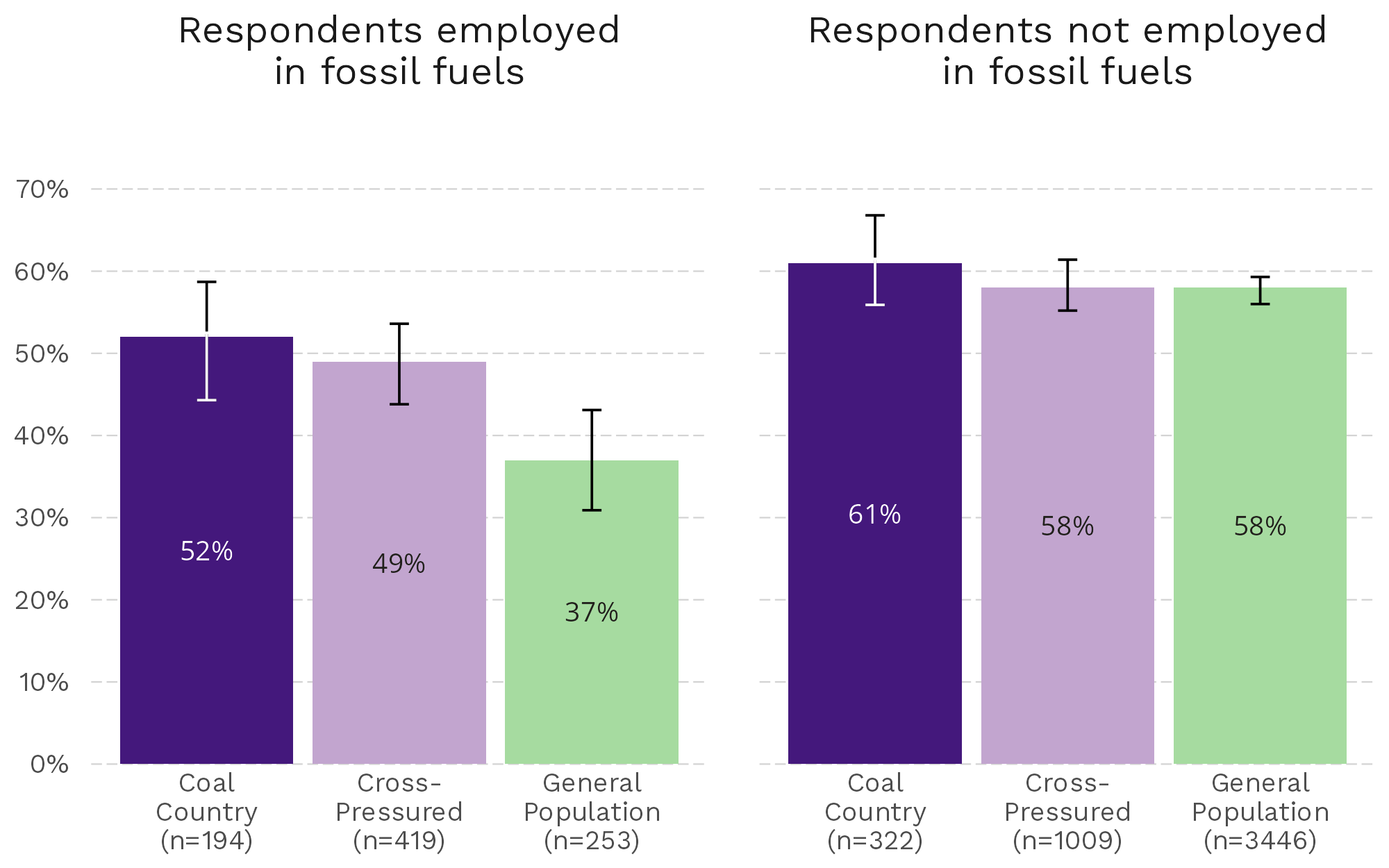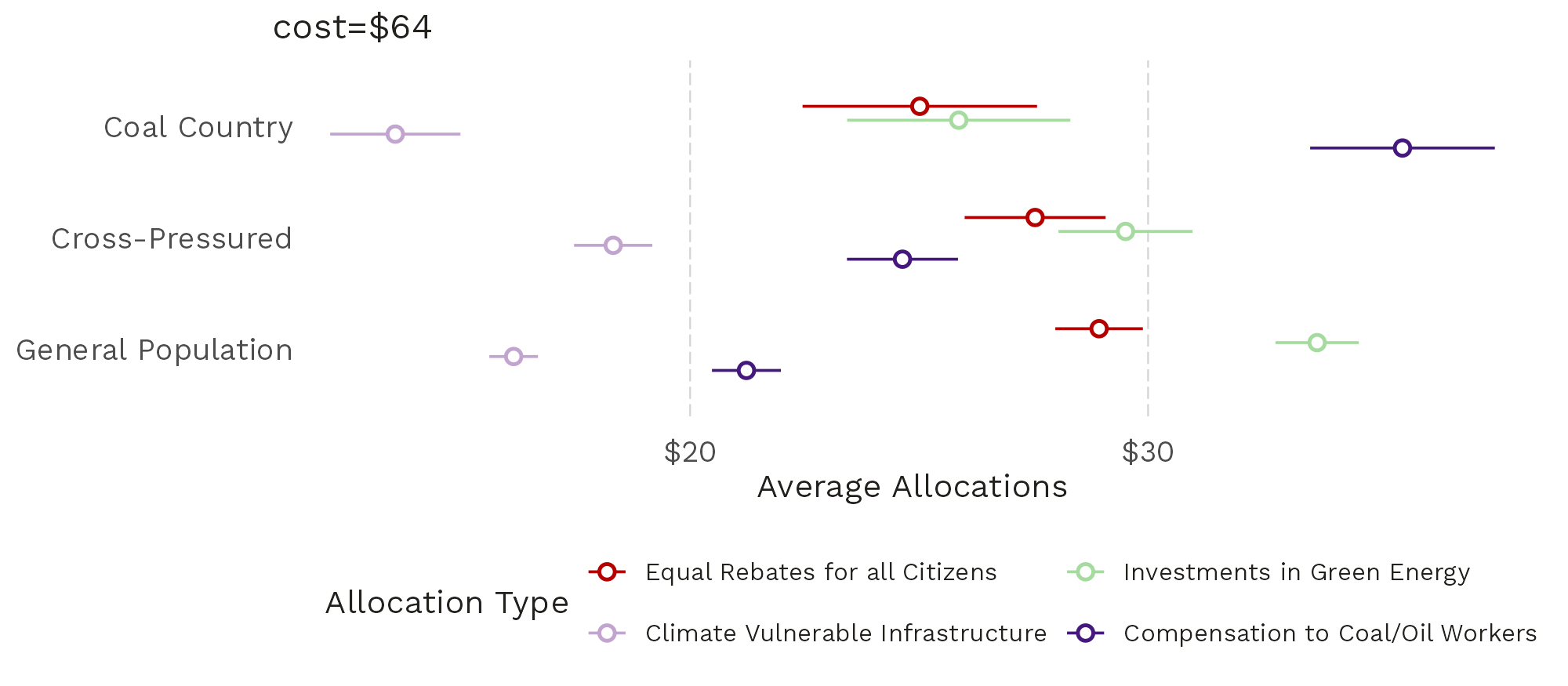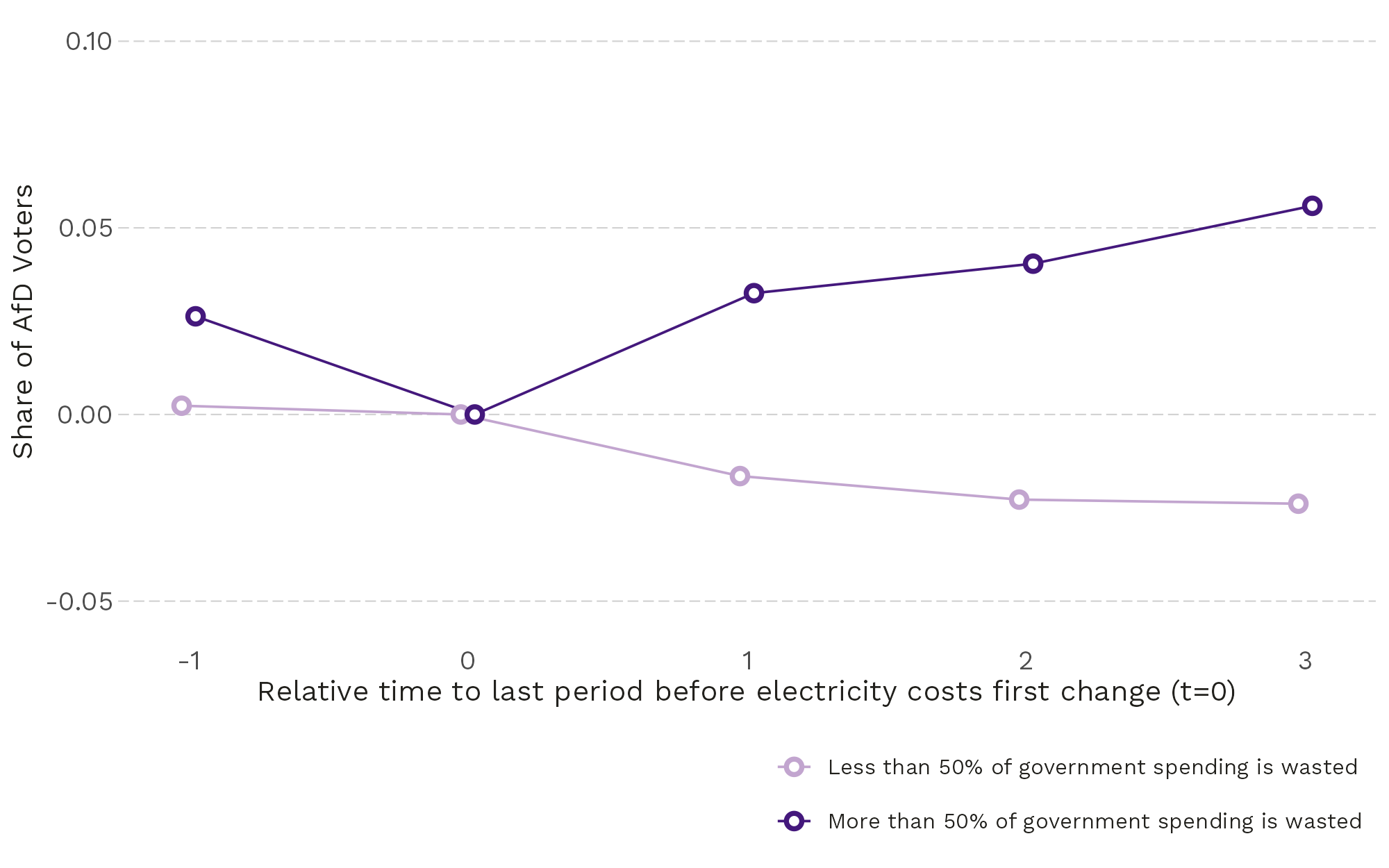Climate policy implies a tension for many established political actors, including progressive ones: mitigating climate change generates future public benefits while its present, immediate costs are often disproportionately borne by segments of the electorate upon whom these actors rely for political survival, notably workers and firms in carbon-intensive industries. The “just transition” paradigm has gained currency in progressive quarters in recent years, in part because it offers a way to resolve that tension by compensating “climate losers”. Against that backdrop, this brief examines the opportunities of climate-related compensation and the challenges that compensatory climate policy might face in the future.
Just energy transitions and the role of compensation in climate politics
As countries across the globe have ramped up their efforts to tackle climate change by reducing greenhouse gas emissions, the question as to how to deal with the losers of the green transition has gained in salience too. Progressive political actors have been key engines of the increased mass- and elite-level political salience of climate change in many countries. Despite that, climate policy presents these actors with a challenge because it often means imposing costs on segments of the electorate that are vulnerable and poorly represented in politics but are nonetheless important to progressive forces – both politically and normatively. The “just transition” paradigm – the idea that the transition from fossil fuels towards green energy sources should be complemented with policies that reduce broader inequalities (e.g. gender, racial, and regional) – has emerged as a popular solution in progressive quarters to that challenge.
Central to implementing “just transitions” is compensating the losers. The normative importance of doing so is widely agreed upon across the ideological spectrum spanned by (centre-) left and green parties, on the one hand, and centre-right ones, on the other. Its political feasibility and efficacy are, however, less clear. While investing in ecological resilience helps socially vulnerable groups, divesting from fossil fuels risks stranding assets and triggering backlash from workers and employers. Yet, the accelerating pace of climate change requires swift, perhaps even dramatic, action, such as the rapid phasing out of coal and the end of oil and gas subsidies. Given that, how can established political actors mobilise groups of voters, many of whom are on the lower-middle income thresholds, to engage in a costly transition that has long-term diffuse benefits?
According to political scientists and political economists, key to both making the green transition a just one and helping to ensure its political viability is to actively compensate the (prospective) losers of climate policy.
Theoretical considerations: Compensation as a winning political strategy
The central political rationale for compensating the “climate losers” – those adversely affected by either climate policy, e.g. workers and businesses in carbon-intensive sectors, or climate change, e.g. homeowners in coastal regions – is to stabilise, consolidate, and, potentially even, broaden the pro-climate policy coalition. In climate policy, like in other areas of public policy, compensation is about reducing the opposition of those that are potentially vulnerable to the adoption or ratcheting up of climate policy and therefore preventing backlash. In the context of climate politics, backlash can take the form of, for instance, mass protests against costly decarbonisation policy or media campaigns by fossil fuel businesses. Both types of backlash have the potential to stymie ambitious climate policymaking. The political importance of compensation in the realm of climate policy, as opposed to other policy fields, is reinforced by climate policies being what scholars refer to as long-term policy investments (Jacobs 2011). These are policies that require the imposition of short-term costs in exchange for benefits that are not only less certain, but also materialise only over a relatively long period of time. If designed effectively, compensatory measures can increase losers’ patience, both among citizens and businesses; in so doing, they help policymakers buy the time necessary for policy investments to yield tangible returns.
The importance of compensation in preventing backlash and reducing opposition is illustrated by variation in protests across various countries, such as the backlash against fuel taxes in France and carbon prices in Canada versus the absence of such protests in Germany. The 2018 Yellow Vest protests in France have become the quintessential example of the deleterious political ramifications that the combination of climate policies (e.g. higher fuel taxes) and (inadequate) compensation can engender. The early 2024 protests against a rise in the federal carbon price in Canada illustrate the comparative relevance of the French episode. In both instances, the urban-rural cleavage figured prominently, with rural regions lamenting that they were disproportionately affected by climate policies. That compensation can potentially prevent such backlash is borne out by, inter alia, the absence of rural protests in the wake of the German government’s adoption of a carbon pricing scheme for the transport and heating sectors in 2019. Crucially, the government combined the latter with a compensatory measure – an allowance for commuters (“Pendlerpauschale”) that primarily benefited rural households.
While these examples concern compensation when targeted at consumers, free allocations in emissions trading schemes – when firms are given free permits – are also a prominent means of compensating carbon-intensive producers. Indeed, free allocations have played an important role in reducing business opposition to such schemes, most notably the European Emissions Trading Scheme (Genovese 2019; Genovese and Tvinnereim 2019). Over the longer term, compensation can also pave the way for broadening the pro-climate coalition among citizens and businesses, especially when complemented with “green” pork – particularistic benefits in the form of, for instance, tax credits or subsidies.
When compensation works and when it does not
The considerable and growing body of research on how compensation influences the acceptability of climate policy can be parsimoniously summarised by grouping results along four criteria that characterise successful compensation, i.e., compensation that stabilises or extends the pro-climate coalition. These criteria are summarised in Table 1.
Table 1. Criteria for successful compensation (authors’ elaboration)
| Criterion | Success (illustrative) | Failure (illustrative) |
|---|---|---|
| Encompassing | Combining carbon pricing with a commuting allowance to neutralise urban-rural inequalities, even within income groups (“Pendlerpauschale” in Germany) | Simple per-capita revenue-recycling of carbon pricing revenues that only takes into account vertical inequalities, while failing to account for differences between urban and rural populations (horizontal inequality) |
| Administratively feasible | Canada Carbon Rebate | “Klimageld” (recycling of carbon pricing revenues) in Germany, at least for now |
| Visible | Klimabonus(recycling of carbon pricing revenues) in Austria | German response to 2022 energy price shock (“Gaskommission”) |
| Credible | Legislation that ties multiple governments’ hands with respect to covering the costs of training programmes for green jobs, particularly if unsuccessful. | Changes in governments with starkly different climate policy agendas can undermine credibility – as can low general trust in government and the tax burden associated with compensation, especially in times of tight budget constraints. |
The first criterion – for which the density of evidence is highest – requires compensation to be encompassing. By encompassing we mean policies that succeed in addressing the set of relevant risks and inequalities that climate policy or climate change creates for individuals or businesses – as opposed to addressing only one type of risk for one type of entity (individuals vs. businesses). While it is usually not necessary for compensation to mitigate all of these risks and inequalities, the literature on the support for carbon pricing suggests that solely compensating individual-level monetary losses via cash transfers (e.g. the equal recycling of revenues from carbon pricing) may have limited effects on boosting the acceptability of climate policy (Mildenberger et al. 2022). Instead, forms of compensation that account for a broader set of risks and inequalities, notably by going beyond simple individual-level monetary transfers (e.g. transfers to one’s local community or investments into climate-related research-and-development initiatives), are often necessary to prevent backlash. In fact, the empirical literature demonstrates that a broader, more encompassing perspective is required. Given the fact that there is relatively little empirical work on encompassing, business-oriented compensation, we next focus on the individual and regional levels, outlining at least four ways of developing such an encompassing approach to climate compensation:
(1) Addressing the distributional effects of climate policy instruments between and within income groups. The horizontal (within income groups) effects of climate policy instruments like carbon pricing are quite potent, sometimes even more so than their vertical (between income groups) effects (Missbach and Steckel 2024). The urban-rural cleavage – one important source of horizontal inequalities (inequalities within income groups) – can be an important driver of anti-climate backlash, but not unconditionally, and the different reactions described above in France and Germany illustrate the importance of taking a broader set of inequalities into account. Another relevant type of inequality is inequality in relative standing or status and, relatedly, whether the burdens of climate policies and compensation are considered fair. This relates to issues of identity and social group ties, which are much harder to compensate for than monetary losses (Gaikwad, Genovese, and Tingley 2022).
(2) Addressing labour market risks created by climate policy. These include the probability of job loss, of having to switch occupations, or of having to relocate geographically. These risks affect the type of compensation demanded by potential losers. What little climate-specific evidence exists, bears out that policies, like unemployment insurance, can increase support for climate policy.
(3) Addressing regional externalities generated by climate policy. This means, for example, compensating not just coal miners, but also those active in the retail sector in coal mining regions. As a result, compensation at a more aggregate level (e.g. regional) is often central for ensuring climate policy buy-in. Bolet, Green, and González-Eguino (2023) demonstrate the promise of such compensation; they show that in 2019 the left-wing Spanish government benefitted electorally by implementing a Just Transition Agreement for phasing out coal mining. The analyses by Gazmararian and Tingley (2023) similarly demonstrate the importance of compensation in the form of investments aimed at revitalising the local economy of regions reliant on carbon-intensive production. Indeed, Gaikwad, Genovese and Tingley (2022) show that even fossil fuel workers prefer, on average, compensation at more aggregated, municipal levels – rather than at the household level (Figure 1).
(4) Addressing the cross-pressure effect of climate change vulnerability itself. As climate change accelerates, exposure to climate damages should be taken into account when devising compensatory measures. Accordingly, individuals can be divided into four groups: those unaffected by both climate policy and damages, those adversely affected by either policy or damages, and those harmed by both (e.g. coal regions with a high incidence of natural disasters). Gaikwad, Genovese, and Tingley (2022) show that, while the preferences of the first three groups follow straightforwardly from the source of risk (policy vs. damages vs. none), those in the fourth group are cross-pressured: the adverse effects of climate policy give rise to opposition to climate mitigation, whereas their exposure to climate damages pushes in the opposite direction (see Figure 2). For policymakers this implies the need to assess the prevalence of cross-pressured individuals in their context and design compensation schemes that address both policy-related and ecological risks
Figure 1. Preferences for compensation at the community level versus individual households 
Figure: Alix d’Agostino, DeFacto · Data source: Gaikwad, Genovese, and Tingley (2022)
Note: Bar plot from Gaikwad, Genovese, and Tingley (2022). Results from three differently geolocated US surveys based on a survey item asking whether compensation for some climate policy should be provided as a transfer to the community or to individual households. Bars indicate percentages preferring community transfers. The graph shows that in most exposed constituencies (coal country and cross-pressured communities where both fossil fuel and ecological risks are salient) a vast amount of people prefer aggregate-level compensation
The second criterion requires that compensation schemes be administratively feasible. Compensation does not work unless it is practicable. It needs to fit the legal and governance structures in place, for example, by being channelled through administrative structures with jurisdiction over the relevant communities or regions (Bayer & Genovese 2024). Having high-quality data that allow policymakers to assess the distributional ramifications of shocks and interventions in real time is also critical. Fetzer et al. (2024) demonstrate the welfare cost of lacking such informational capacity in the context of the German and UK responses to the 2022 energy price shocks.
Figure 2. Preferred compensatory goals across different constituencies 
Figure: Alix d’Agostino, DeFacto · Data source: Gaikwad, Genovese, and Tingley (2022)
Note: Coefficient plot from Gaikwad, Genovese, and Tingley (2022). Results from three differently geolocated US surveys based on an allocation exercise that asked respondents to indicate the preferred break-up of a pot of money over four compensatory choices (cost of the policy fixed here at $64). Cross-pressured voters are most strongly in favour of adaptation investments.
The third criterion – visibility – requires that people know they are being or have been compensated, or that they are eligible for compensation. It is common for people receiving state-funded benefits to not be aware that the state helps them. Furthermore, low take-up of compensation schemes is a prominent theme in other areas of research, such as the literature on trade politics. Konc et al. (2024) leverage the idiosyncrasies of the German electricity market – which imply that the exact time at which households receive their energy bills is as good as random – to identify the effect of 2022 energy price shock in Germany on, inter alia, support for the far-right populist party AfD. Crucially, the German government implemented a compensatory scheme, but Konc et al. (2024) find that more than 60% of households that were eligible for this scheme did not know about its existence.
The fourth criterion – that compensation be credible – requires losers to believe that governments will keep their promise to compensate them, not just today but also in the future. Ex ante (before a policy is implemented) it is almost always optimal for governments to promise compensation to the losers. Ex post, however, governments might have an incentive to renege on that promise because doing so increases, for instance, their fiscal wiggle room. When losers anticipate this divergence in incentives, the promise of compensation lacks credibility and will fail to allay their worries. Credibility therefore requires governments to find ways of preventing this divergence of incentives.
When the levers of the state change hands between ideologically different parties or unexpected crises lead to a tightening of the budget constraint, governments may well have an incentive to cut back compensation promised previously, or abolish it altogether. The commitment problem associated with compensation is particularly important for climate policy by virtue of its long-term nature, as noted above. Concerns about credibility can undermine the backlash-reducing effects of compensation (Gazmararian and Tingley 2023). Indeed, as Figure 3 shows, Konc et al. (2024) show that the 2022 energy price shock in Germany increased support for the AfD significantly more strongly among households that believe the government wastes more than 50% of its tax revenue – despite the government having implemented a compensation scheme for the price shock. The general lesson we can draw from Figure 3 and the research summarised by Toenshoff (2024) is that any given amount of compensation will be less effective in allaying the worries of losers, the lower their trust in policymakers, especially when low trust leads losers to discount compensatory efforts.
Figure 3. Change in support for AfD by beliefs about government efficiency 
Figure: Alix d’Agostino, DeFacto · Data source: Konc et al. (2024)
Note: Coefficient plot from Konc et al. (2024). The interpretation is that a doubling in electricity costs led to a five- percentage point increase in AfD support among people who believe the government wastes more than half of its tax revenue.
In sum, the empirical literature suggests that for compensation to stand a chance of effectively preventing backlash it must be encompassing, visible, feasible, and credible. These are conditions that can be shaped via corporatist bargaining (where possible) and, more broadly, negotiations between governments and “climate losers”. Yet, meeting these four criteria remains difficult, even when compensation is designed by those with a great deal of context-specific knowledge. For progressive political actors, we believe two challenges and the trade-offs they entail are particularly important: designing democratic processes for compensation and ensuring its economic sustainability.
Democratic bargaining – especially when it is intended to give voice to all those affected by climate policy or their representatives – is time-consuming and incremental. Maximising the inclusiveness of democratic processes may prevent swift compensation. Reducing inclusiveness, however, may well impinge on the efficacy of compensation by, for instance, failing to be sufficiently encompassing. The trade-off between inclusiveness and swiftness also rears its head when it comes to the involvement of technocratic actors. Their expertise is often vital for designing efficient and feasible compensation, but – even when administrative capacity is high and implementation is not a problem – they may overlook key sources of inequalities or risk, including non-material, status-related losses and those in relative standing. Designing new processes or institutions for bargaining with “climate losers” is particularly important for progressive political actors since key institutions linking parties to broader segments of society, notably trade unions, have declined.
Safeguarding the economic sustainability of compensation and thus its credibility is an equally, if not more, daunting challenge. Many advanced industrialised democracies face budgetary pressures owing to both short-term developments, such as rising interest rates and climate damages, and longer-term changes, including ageing societies. These fiscal pressures are particularly severe for politically progressive forces, which tend to recognise the need for considerable public investment, especially after the period of austerity that many countries endured during the 2010s. These pressures can turn into an intricate dilemma when governments have to trade-off whether to compensate businesses or individuals/households. While public debt may help alleviate some of these trade-offs in the short term, embedding climate compensation in the broader tax system is crucial for the long-term credibility of compensation. Indeed, it is unclear how durable compensation programmes should be, and therefore how many generations should bear the costs of compensation, for climate policy to be successful. Locking in compensation without sunset clauses, as it were, might well tighten the intergenerational budget constraint and reduce the fiscal wiggle room of future generations. Balancing “just” climate action, intergenerational fairness, and political feasibility will be a major challenge for progressive political actors.
Conclusion
This research brief discusses the role that compensation can play in making the green transition both just and politically robust. In light of the best available evidence on the impact of compensation in climate politics, there is reason to believe that compensation can work in catalysing climate action, but not under all circumstances. We make the case that the most productive and resilient forms of compensatory climate policy designs are those that are encompassing, visible, feasible, and credible. We wish to emphasise that it is possible, albeit anything but easy, to design policies that meet these criteria. With an eye to progressive politics, we also point out some of the major hurdles and trade-offs – including fiscal pressures potentially forcing them to choose between compensating individuals or businesses and the fact that inclusive processes for designing encompassing compensation may prevent governments from responding swiftly to crises – that progressive political forces have to confront head-on if they want to maximise the effectiveness of compensation and avoid its pitfalls, especially in the new era of anti-climate backlash.
Based on
Gaikwad, N., F. Genovese, and D. Tingley. 2022. ‘Creating climate coalitions: Mass preferences for compensating vulnerability in the world’s two largest democracies.’ American Political Science Review 116(4): 1165-83.
Konc, T., J. Edenhofer, and J. C. Steckel. 2024. ‘Climate policy in hard times: Why making compensation work is key for preventing backlash, but much harder than economists usually acknowledge.’ Eco 11 (Forthcoming).
References
Bayer, P., and F. Genovese. 2024. ‘Climate policy costs, regional politics and backlash against international cooperation’. OSF working paper. https://osf.io/5k8wy/.
Bolet, D., F . Green, and M. González-Eguino. 2024. ‘How to get coal country to vote for climate policy: The effect of a “just transition agreement” on Spanish election results’. American Political Science Review 118(3):1344–1359.
Fetzer, T ., C. Shaw, and J. Edenhofer. 2024. ‘Informational boundaries of the state’. CESifo Working Paper Series. https://ideas.repec.org//p/ces/ceswps/_10901.html.
Gazmararian, A. F., and D. Tingley. 2023. Uncertain Futures: How to Unlock the Climate Impasse. Cambridge: Cambridge University Press.
Genovese, F . 2019. ‘Sectors, pollution, and trade: How industrial interests shape domestic positions on global climate agreements’. International Studies Quarterly 63(4): 819–36.
Genovese, F . and E. Tvinnereim. 2019. ‘Who opposes climate regulation? Business preferences for the European emission trading scheme’. The Review of International Organizations 14(3): 511–42.
Jacobs, A. M. 2011. Governing for the Long Term: Democracy and the Politics of Investment. Cambridge University Press.
Mildenberger, M., E. Lachapelle, K. Harrison, and I. Stadelmann-Steffen. 2022. ‘Limited impacts of carbon tax rebate programmes on public support for carbon pricing’. Nature Climate Change 12(2): 141–47.
Missbach, L., and J. C. Steckel. 2024. Distributional impacts of climate policy and effective compensation: Evidence from 88 countries. Kiel, Hamburg: ZBW – Leibniz Information Centre for Economics. Working Paper. https://www.econstor.eu/handle/10419/29649.
Note: This article has been edited by Raed Hartmann, DeFacto.






